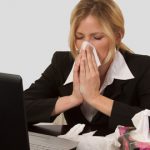 Ever tried to keep it hush-hush when you’re down with a contagious bug? Maybe you held back a cough at a work meeting or kept mum about that scratchy throat on a first date. If you’ve ever pulled off such stealth moves, you’re not alone, says a fresh study from the University of Michigan.
Ever tried to keep it hush-hush when you’re down with a contagious bug? Maybe you held back a cough at a work meeting or kept mum about that scratchy throat on a first date. If you’ve ever pulled off such stealth moves, you’re not alone, says a fresh study from the University of Michigan.
Turns out, folks dealing with contagious sicknesses deal with social downsides, like getting left out. So, they tend to play it cool and keep their health situation on the down low, according to the study.
Social norms
“These findings highlight the trade-offs people make between societally normative motives (like honesty, not harming others) and personally desirable motives (like pursuing one’s own goals, not worrying others),” the researchers explain.
The scientists pored over data from 10 studies that delved into past, present, and future illnesses. They dug into how often and why over 4,100 American university students, healthcare workers, and online workers hid their sickness.
Turns out, a whopping 75% of the folks surveyed kept their illnesses under wraps during personal interactions, possibly risking others’ health. Even among healthcare workers, 61% either stayed mum, actively covered up, messed up a required app symptom check at least once, or planned to keep things on the down low in the future.
Hiding illnesses
The study revealed that the main reasons for hiding illnesses were mostly social, like wanting to hit up parties, and achievement-related, such as meeting work goals. Oddly enough, very few mentioned strict work policies (like no paid time off) as the main reason for their secrecy.
“Disease concealment appears to be a widely prevalent behavior by which concealers trade off risks to others in favor of their own social goals, creating potentially important public health consequences,” the authors explain.
The nature of the illness, like how much harm it could do and how quickly it could strike, played a role in people’s decisions to keep their sickness under wraps, according to the researchers.
Always someone else
Interestingly, those in good health believed they wouldn’t likely hide illnesses that could cause harm—those that spread easily and come with severe symptoms. On the flip side, people who were actually sick were found to hide their illnesses a lot, regardless of how harmful their sickness could be to others.
“Sick people and healthy people evaluate the consequences of concealment in different ways, with sick people being relatively insensitive to how spreadable and severe their illness may be for others,” the researchers continue.
To promote truthful reporting of illness, institutions have taken steps. For instance, during the COVID-19 pandemic, some universities required students to use an app-based symptom screening tool before entering campus buildings.
In one study, college students were questioned about how often they used the screening tool accurately when feeling unwell. Surprisingly, about 41% admitted to misusing the screener, attempting to hide their illness when not feeling up to par.
“This suggests that solutions to the problem of disease concealment may need to rely on more than just individual goodwill,” the authors conclude.